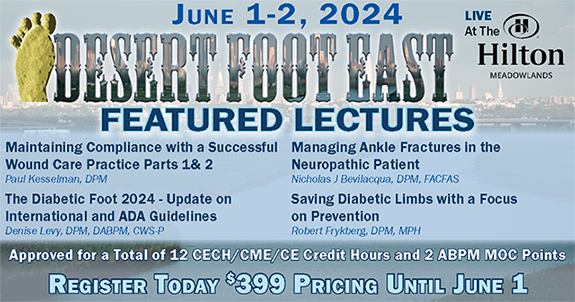
Practice Perfect 913
The Pod Periop Medical Management Series #7:
Patients With Rheumatologic Disorders
Part 2 - Rheumatologic Medications
The Pod Periop Medical Management Series #7:
Patients With Rheumatologic Disorders
Part 2 - Rheumatologic Medications

Welcome back to this, our last editorial in the podiatric perioperative management series. In this series, we have discussed general perioperative medical topics including preoperative testing, including what labs and imaging will help manage risk during the perioperative period, preoperative cardiac risk assessment and cardiac related medications, diabetes risk assessment and medications, and issues pertinent to patients with rheumatologic disorders. Today, in our final issue, we will discuss in a quick and high yield manner management of rheumatologic associated medications during the perioperative period.
Before we get to the specific drug management recommendations, there are a few important concepts to remember about patients with rheumatologic disorders, the most common being rheumatoid arthritis (RA), systemic lupus erythematosus (SLE), Sjogren’s syndrome, gout, and the seronegative arthropathies (psoriatic arthritis, ankylosing spondylitis, reactive arthritis, and inflammatory bowel disease-associated arthritis).
- Recall the increased risk of cardiovascular disease in many of these disorders. A thorough cardiac risk assessment should be performed.
- Some of these disorders, such as RA and SLE, may have associated disorders that may affect clotting (for example, antiphospholipid antibody syndrome in RA and SLE).
- Patients on immunosuppressive medications may also be at increased risk for infections.
Perioperative Corticosteroids – Should We Keep Loading?
This question deserves a little more focus than a table is capable of reporting, to see if it is still necessary to give surgical patients loading doses of corticosteroids. It turns out that this topic is somewhat controversial. As we are well aware, previous guidelines recommended that patients on long-term and/or high doses of steroids should be given loading doses (“stress doses”) of corticosteroids in the perioperative period. You’ll recall that this is to prevent the dreaded complication of acute adrenal insufficiency and vascular collapse. Guidelines generally varied by amount, how many doses, and when to return back to preoperative doses. Then a systematic review came out in 2018, studying two randomized controlled trials and 5 cohort studies (total of 499 patients) that found, “…it is not possible to conclude that perioperative administration of corticosteroids, compared to placebo, reduces the incidence of adrenal insufficiency.”1 Unfortunately, the methodologic quality of the individual studies (and others not included in this study) has been low, so we still don’t know this answer for certain.
The general trend by most societies leans toward not giving stress doses of steroid perioperatively while leaving patients on their current corticosteroids during the perioperative period. However, since this remains an area of continued study, consult with your medical team preop.
The general trend by most societies leans toward leaving patients on their current dose of corticosteroids during the perioperative period, rather than giving stress doses of steroid perioperatively. However, consult with your medical team preop.
Finally, the Medications!
The table below shows general recommendations for continuing or holding medications for patients with rheumatologic disorders. This information comes primarily from Goodman, et al2 and Goodman and George.3 This table is by no means complete and surgeons should always consult with the patients’ medical teams, including the rheumatologist when planning a trip to the operating room. Brand names are included, not as advertisements, but to improve name recognition.
| Medication Class | Examples | Comments |
| DMARDS | ||
| Nonbiologic DMARDs | Methotrexate Hydrochloroquine Sulfasalazine Leflunomide (Arava) Apremilast (Otezla) Doxycycline |
Continue throughout surgery. |
| Biologic DMARDs | Abatacept (Orencia) Adalimumab (Humira) Etanercept (Enbrel) Golimumab (Symponi) Infliximab (Remicade) Rituximab (Rituxan) |
Hold medication perioperatively. Schedule surgery 1 week after scheduled last dose in series. |
| Targeted Synthetic DMARDs JAK inhibitors |
Tofacitinib (Xeljanz) Baricitinib (Olumiant) Upadacitinib (Rinvoq) |
Hold 3 days prior to surgery. |
| Others | Tacrolimus Cyclosporin Azathioprine |
Continue perioperatively. Discontinue if not severe SLE. Discontinue if not severe SLE. |
One final word about podiatry’s favorite rheumatologic disease, gout. Perhaps more important than holding or continuing the medications these patients are taking, is the risk of a postoperative gout attack. The key to this is to maintain patient hydration as much as possible and some recommend prescribing colchicine 0.5 mg three times per day for two to four days before the procedure. No matter the medication, these patients are medically complex and always do better with a comprehensive team-based evaluation before letting the knife touch the skin.
Best wishes.

Jarrod Shapiro, DPM
PRESENT Practice Perfect Editor
[email protected]

-
Groleau C, Morin SN, Vautour L, Amar-Zifkin A, Bessissow A. Perioperative corticosteroid administration: a system review and descriptive analysis. Perioper Med (Lond). 2018 Jun 8:7:10.
Follow this link -
Goodman SM, Springer BD, Chen AF, et al. 2022 American College of Rheumatology/American Association of Hip and Knee Surgeons Guideline for the Perioperative Management of Antirheumatic Medication in Patients With Rheumatic Diseases Undergoing Elective Total Hip or Total Knee Rrthroplasty. Arthritis Care Res. 2022 Sep;74(9):1399-1408.
Follow this link -
Goodman SM, George MD. Should we stop or continue conventional synthetic (including glucocorticoids) and targeted DMARDs before surgery in patients with inflammatory rheumatic diseases? RMD Open. 2020 Jul;6(2):e001214.
Follow this link
































Comments
There are 0 comments for this article